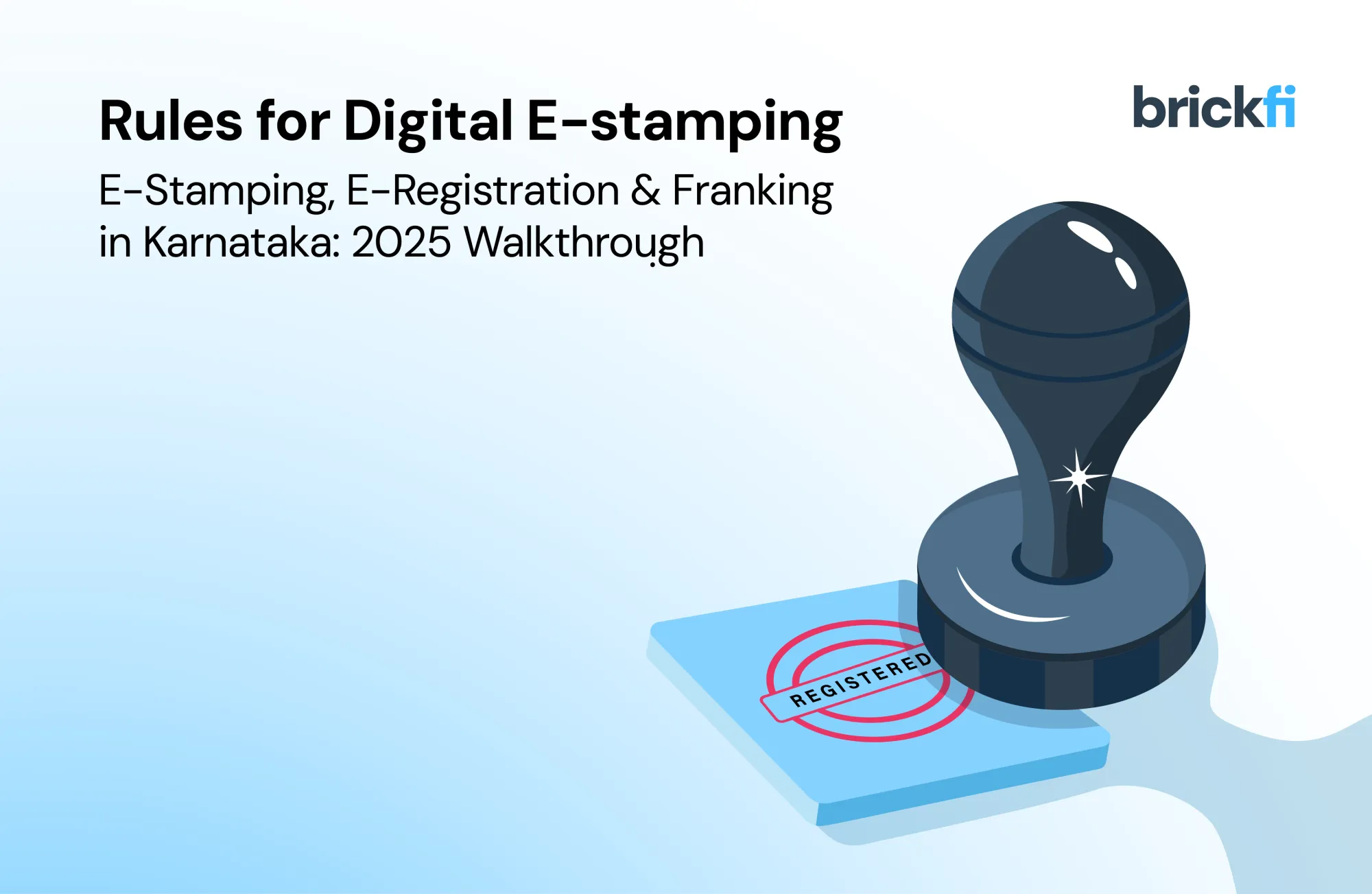E‑Stamping, E‑Registration & Franking in Karnataka: 2025 Walkthrough
Learn how e-stamping, franking, and Kaveri portal work for property registration in Karnataka. Avoid errors and calculate stamp duty with ease.

Key Takeaways
- Karnataka has adopted digital e-stamping under its Stamp Rules and is moving toward fully paperless registration.
- The Kaveri Online Services portal handles property registration, stamp duty calculation, booking SRO slots, EC downloads, and more.
- Stamp duty rates in Karnataka range from 2 % to 5 % depending on property value; registration fee is typically 1 %.
- Franking centers (authorized ACCs) are important for e-stamp issuance, especially for certain value thresholds.
- Understanding rules, service centers, and fees in advance helps buyers avoid delays or rejection at Sub-Registrar offices.
Overview: Rules for Digital E-Stamping
Until recently, buying stamp papers physically was the norm for property and agreement documentation. But with modernization and digital governance, Karnataka has formalized digital e-stamping as per its Stamp Act and associated rules. E-stamping replaces physical stamp papers with electronically generated certificates, making the process more secure, transparent, and efficient.
To use e-stamped documents legally, you must follow the rules: use approved portals or ACC (Authorized Collection Centers), ensure correct duty is paid, and verify via QR codes or certificates before registration. Karnataka’s government is pushing toward a fully digital stamping and registration ecosystem in 2025, which means understanding the rules now will help you stay ahead.
Whether you’re registering property in Bangalore or anywhere in Karnataka, knowing about digital stamping, franking, Kaveri portal processes, and stamp duty rates is essential for clean, hassle-free property transactions.
Get instant access to expert, data-driven property insights.
Request your free Brickfi investment report now and make smarter real estate decisions today.
The Legal Foundation: Karnataka Stamp Rules & Acts
Karnataka’s digital stamping framework is based on the Stamp (Payment of Duty by Means of E-Stamping) Rules, 2009, under the broader Karnataka Stamp Act 1957. These rules allow for duties to be paid electronically rather than via physical stamp papers.
In 2025, Karnataka proposed new Digital e-Stamp Rules to make the process completely paperless: direct payment integration, elimination of SHCIL service charges, and integration with treasury systems. These drafts aim to modernize the stamping and registration infrastructure across the state.
Together, the Act and Rules define procedures, authorized collection centers, required documentation, verification, and penalties for noncompliance. It is critical that users and property professionals stay aligned with these guidelines as they evolve.
How Digital E-Stamping Works in Karnataka
- Choose the Correct Article Type For property sale agreements, use Article 5(E) under the Stamp Act. If you pick the wrong article (like “Other Agreements”), your document may be invalid at registration time.
- Calculate Stamp Duty Enter property details, consideration value, and duty will be computed based on current rates. In 2025, Karnataka’s slab system charges 2 % on properties below ₹20 lakh, 3 % for ₹20–45 lakh, and 5 % above ₹45 lakh, with registration fee of 1 %.
- Select ACC or e-Stamp Portal Authorized Collection Centers (ACCs) are designated offices or co-operative societies that can issue stamped certificates. You may also use approved online portals if available.
- Generate E-Stamp Certificate After payment, you receive an e-stamp certificate with a unique ID and QR code. This certificate is tamper-proof and can be verified online.
- Attach to Sale Agreement / Document The document (sale agreement, lease, POA) must incorporate the e-stamp certificate. The certificate is considered part of the agreement.
- Registration at SRO When you register the instrument (sale deed, gift deed, etc.), present the e-stamp and other required papers at the Sub-Registrar Office (SRO).
- Verification & Authenticity Check The SRO staff or you may verify the e-stamp’s authenticity via the certificate’s QR or reference number.
Get instant access to expert, data-driven property insights.
Request your free Brickfi investment report now and make smarter real estate decisions today.
Role of Franking Charges in Bangalore
Even with e-stamping, franking remains relevant in some contexts—especially for high-value documents or transitional phases of the system. Franking is an impression or mark of cancellation over stamps, showing that they have been used. In Bangalore, ACC centers authorized by the stamp office continue to apply franking for certain documents or as backup when e-stamp quantity limits are reached.
Franking charges are small fees paid at ACCs beyond the base stamp duty. These must be budgeted, though many property agreements and registration processes increasingly rely solely on e-stamp validity.
Kaveri Online Services Registration & Use
Karnataka’s government has digitized many property services via the Kaveri Online Services portal (Kaveri 2.0) managed by Department of Stamps & Registration. Through this portal, users can:
- Calculate stamp duty and registration fees
- Book registration appointments at SROs
- Submit documents for registration
- Download Encumbrance Certificates (EC)
- Get certified copies of registered documents
You need to register for an account (using PAN, Aadhaar, etc.) and log in to access services. The portal simplifies the property registration ecosystem in Karnataka, reducing the need for repeated office visits.
Stamp Duty Rates & Registration Charges
As of 2025, these are the commonly applied rates in Karnataka:
- Up to ₹20 lakh → Stamp duty 2 %, registration fee 1 %
- ₹20 – ₹45 lakh → Stamp duty 3 %, registration fee 1 %
- Above ₹45 lakh → Stamp duty 5 %, registration fee 1 %
These percentages apply to the consideration value or market value, whichever is higher. There may be surcharges or cess too, depending on the city or urban zone.
These rates must be paid before registration. If a value is understated, authorities may revalue and demand more duty. Always use the Kaveri portal’s duty calculator to compute correctly.
Get instant access to expert, data-driven property insights.
Request your free Brickfi investment report now and make smarter real estate decisions today.
Common Pitfalls & Mistakes to Avoid
- Using incorrect Article code and failing registration
- Underestimating value and paying lower duty (leading to revaluation or rejection)
- Ignoring franking when required or assuming e-stamp alone is enough
- Delays in e-stamp certificate issuance causing document expiry
- Not registering with Kaveri portal before attempting registration
- Using unapproved ACCs or portals that issue non-valid stamps
- Failing to verify e-stamp authenticity before submission
- Changes in Karnataka’s rules during drafts or amendments may affect valid procedures
How Buyers and Sellers Can Prepare
- Always verify that the e-stamp certificate number is valid and shows correct property details
- Check that the stamp matches Article 5(E) for property transactions
- Use Kaveri portal’s duty calculator to avoid mismatches
- During registration, carry proof of payment and the document containing the e-stamp
- Verify whether franking is required and include that cost early
- Keep scan or digital copy of e-stamp certificate and transaction ID
- If new 2025 digital rules are adopted, ensure you follow them to avoid rejections
Digital Future & Draft Rules
Karnataka’s government is actively moving toward making the e-stamping and registration process fully digital. The draft Digital e-Stamp Rules, 2025 propose eliminating physical stamp processes entirely, integrating treasury collections, and reducing intermediaries. Under these rules, documentation, stamping, and registration may become seamless and paperless.
As with any draft, these rules are subject to feedback and final notifications. Anyone using property or legality services in Karnataka should watch for official adoption and stay updated with departmental advisories.
FAQs: Rules for digital e-stamping
Is e-stamping mandatory in Karnataka?
Yes for most property-related documents. Karnataka follows the Stamp (Payment by Means of E-Stamping) Rules to enforce digital stamping for non-judicial documents.
How do I register on Kaveri Online Services?
Visit the portal, click ‘Register as New User’, fill your details including identity proofs, get your account activated, and log in.
What is the role of ACC in e-stamping?
Authorized Collection Centers (ACCs) issue e-stamp certificates and apply franking when needed. They act as authorized agencies between government and user.
Can I pay stamp duty online but still have physical stamp papers?
No, in Karnataka the trend is to replace physical census with e-stamp certificates. Physical stamp papers are generally phased out for property sale agreements.
What if the e-stamp is found invalid at SRO?
It may lead to rejection or demands for additional duty and penalties. Always verify authenticity before approaching registration.
Get instant access to expert, data-driven property insights.
Request your free Brickfi investment report now and make smarter real estate decisions today.
